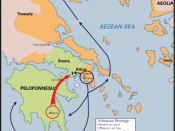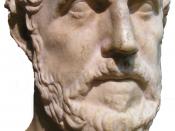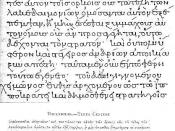"Thucydides is the father of realism."(Nye, 9) In his book, the History of the Peloponnesian War, he illustrates the power of politics due to the policies of realism. In relation to Edward Vose Gulick (Europe's Classical Balance of Power) and Joseph Nye (Understanding International Conflicts), Thucydides' approach to conflict is encompassed within a universal understanding of human nature and other policies of liberalism and constructivism.
Realism is the idea that people perceive the actually existing world. Thucydides thought that because of the continuing state of anarchy, war in international politics is inevitable. He observed the Peloponnesian War through an objective eye, but knew that this war was the first of many like it. He claimed that he gave his account of what happened and did not idealize or criticize the situation while it was taking place. Thucydides knew that he could not give every descriptive detail of the Peloponnesian War: "In investigating past history, and in forming the conclusion which I have formed, it must be admitted that one cannot rely on every detail which has come down to us be way of tradition."
(Thucydides, 46). Although, while reading his historical account, one cannot help but think that he had some bias to the means of war.
Thus, it is from this bias that one retains the notion that Thucydides may be interpreted through the lens of liberalism and constructivism. Liberalism is the idea that what matters in political affairs is the absolute freedom and rights of the individual. Thucydides reveals this idea through his early concept of the balance of power. He believed in the rights of individual sovereign states and that no one state shall become a hegemon. As a liberalist, Thucydides contemplated that war is not an unchanging condition of anarchy. He believed that...


